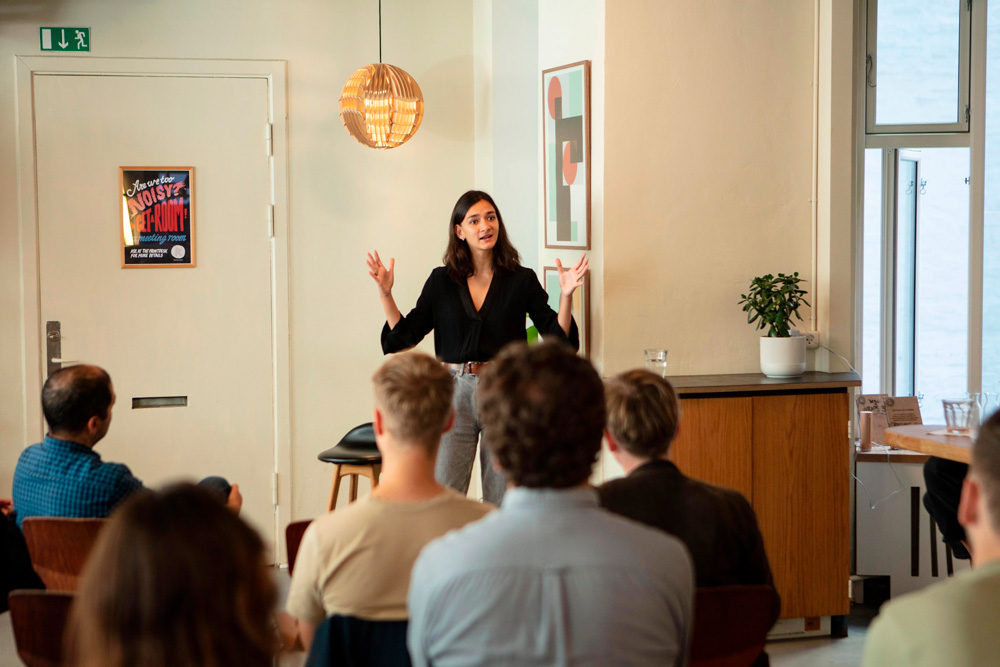By Yoko Inoue — a Republikken member
On September 2, we hosted the first round of “Republikken Talk”, a series of talks where 10 selected people would share how they have been responding to the pandemic by rethinking their business to survive the crisis.
The second speaker of this series was a young and energetic entrepreneur, Nima Tisdall (Founder of Blue Lobster). It was fascinating to hear how “young girls coming out of nowhere” have moved the fish industry to be more sustainable.

Nima Tisdal (Co-founder of Blue Lobster) — photo Oskar Cornelius
Started from a simple question and curiosity
I co-founded Blue Lobster in 2018 with Christine, who is American. One day she asked me, “why is all of your fish old and crap?” That’s something I haven’t thought about before. So out of curiosity, we walked down to the harbour and asked where we could buy fish. They said that we could buy there with cash, but otherwise fish would be sold at the auction in Jylland.
Somehow, middlemen and auctions have to get involved and fish that landed just outside Copenhagen was picked up by transporters and driven all the way to Jylland to be sold at auctions. In the restaurant at the harbour, people ate fish bought from a wholesaler while they saw fishermen who actually caught the same fish right there. It didn’t make sense. We also learned that fishermen had not been earning enough money for the past two decades and 42% of them were gone.
That’s how we came up with a business to create a direct connection between fishermen and buyers. We wanted to build a tech platform to establish this connection.
In 2019, while we waited for the app to be ready, someone told us we’d better start selling fish now. So we started knocking on the doors and asked if they wanted fish caught within 24 hours. They loved it. Later on, we added values on sustainability, but the real value for chefs was fresher fish.

Nima Tisdal on sustainability — photo Oskar Cornelius
Ways to promote sustainability through business
We quickly found out that there were sustainability issues in the fishing industry. It’s about how much and how efficiently you fish. Governments control how much we fish, but what we can control is how efficiently we fish. If you fish with a static net that hangs in the water, the smaller fish can swim through holes in the net. Unsustainable fishing is having a trawler that drops a huge metal beam onto the bottom of the ocean and rips open the ocean floor while emitting CO2.
At a very early stage, we decided to only work with sustainable fishermen. And since we cut all the middlemen, we can pay 2–4 times as much to the fishermen. Creating an economic incentive for working with us, we tried to leverage to push the industry toward a more sustainable direction. We’ve partnered with the low-impact fishing union and they help people to pay for transitioning into more sustainable equipment.
Challenge turned into a gift
Our business focused entirely on restaurants, so when the pandemic hit and shut down the restaurant industry, all of our revenue basically stopped. We had just hired our first two employees. At the beginning of December, when the second lockdown started, we looked at each other. Christmas is the big fish season, so what would we do?
We started to change our entire data infrastructure to allow private customers to buy from the app. Now 5,500 customers are on the app. It was a great change because now we can talk about sustainability directly to customers. We felt that we made an impact and that was super rewarding.
We are now working on a reporting tool. It is the one-click solution where fishermen can upload their catches and data get sent to the accountants. That means everything coming through our platform has been reported to the quota system, which also is a huge sustainability implication because illegal and underreported catches are one of the big issues in the fishing industry.
If I knew the complexities of this industry, maybe I wouldn’t have thrown myself into it. Fishermen are incredibly skeptical of us, of course. We are two young girls coming out of nowhere and we tell them to do things differently. But that enabled us to notice things that you don’t see once you’re in it. In the end, that was a gift.

